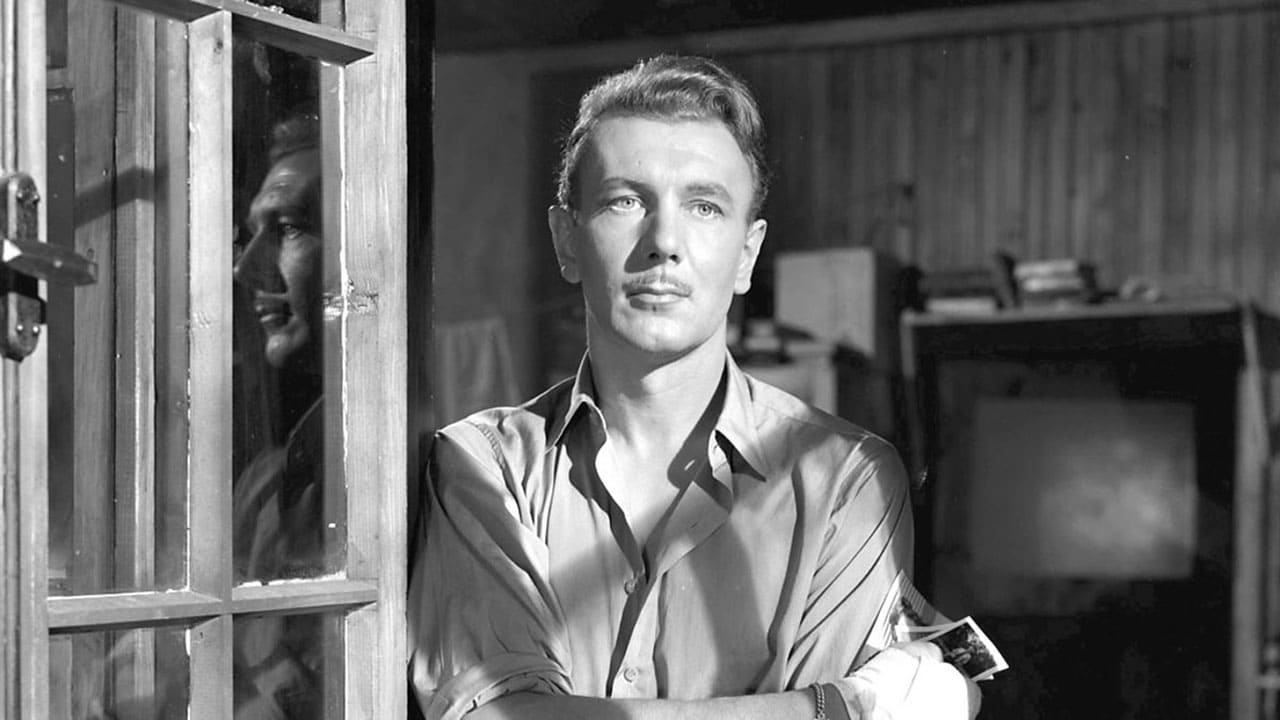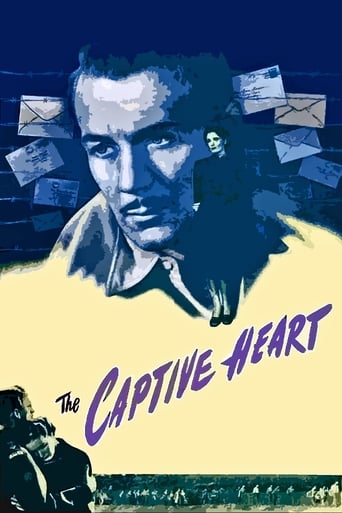

THE CAPTIVE HEART is one of the earlier movies from Ealing Studios, made before they were known for their genteel, witty comedies. It's a standard WW2 prisoner of war flick, with a greater depth of characterisation than most. At times it gets into romantic and tragic territory, recalling the likes of BRIEF ENCOUNTER, but it also includes some genre tropes and ideas which add excitement. As with many British war films of this era, most of the fun comes from seeing an ensemble cast doing their bit, from the big names like Michael Redgrave and Mervyn Johns right through to the smaller parts from the youthful Gordon Jackson and Sam Kydd.
... View MoreThe movie is a broad photo montage of several stories--from one setting--of British soldiers who were captured early in WWII (1941) and placed in a German POW camp. Is depicts what happens to them and their loved ones, back home, as they are separated by time and space. How do the relationships change? How do they remain the same? What holds them together or drives them apart? Four years can be like a lifetime to those it affects. This is no Stalag 17 or Hogan's Heroes-type movie. I found the movie to be very engaging and enjoyable, even as half of a long-range relationship undergoes very big changes. Changes can range anywhere from physical disability, to "Dear John" letters, to birth and/or death. The relationship often—usually—depend on letters and photos back and forth.
... View MoreA diverse group of British prisoners of war wind up in a camp in Holland. Among the genuine men is a Czech escapee sought by the Gestapo, Michael Redgrave. He stumbled across the body of a British officer and assumed his identity. The Brits soon twig and are supportive but a Gestapo visitor, Karel Stepanek, keeps wondering where he met "Captain Mitchell" before. It seems only a matter of time.Escape being impossible, the men have little to do except create tiny gardens and cricket playing fields in order to create a little bit of England in the prison camp. And they wait for the mail. It's their lifeline to the outer world. For most of the men, the news from outside is good but we get to know the stories, in short flashbacks, of those whose messages are troublesome. A man's wife dies in childbirth. Another breaks off his engagement because he doesn't want his girl to know he's blind. Another gets a poison pen letter accusing his wife of infidelity.The man in the worst spot, of course, is Redgrave the impostor. The affable Gestapo officer remarks that Redgrave has been receiving mail but has written no letters in reply. Redgrave must write to a dead man's wife, but if he does, he can't tell her the truth because the mail is censored. In any case, his handwriting will give his secret away to the woman at the other end. So he does what any normal man would do to save his life -- he has his right hand smashed by a sledge hammer and writes with his left hand to mask his real identity.The movie is a tribute to the men who kept a stiff upper lip throughout their four-year incarceration and an encomium to the post. The real subject of the movie is the mail. The plot isn't very clear about the point but I believe the delivery of mail was handled through the International Red Cross in Switzerland.The men boarded up in camp don't really DO very much. There is no combat and only a few shots are fired. (They accidentally kill a guard dog.) There are longueurs, but in the end many of the prisoners are repatriated and sent back to England, including Redgrave, who manages to be included only at the sacrifice of another man's good luck.The scenes of the men's return are moving and adroitly handled. No one breaks into sobs. Deaths at home are accepted. Men's conflicts are resolved, happily in each case, and their families' too.It isn't a bad film, especially considering its period -- 1946. The war had just ended and no one was concerned about the Germans' feelings, yet the Germans we see are uniformly good-natured and reasonable. Not that we get to see much of them. And of course there is always the threat of the Gestapo for Redgrave to worry about. And none of the girls back home are glamorous either. Like their men, they look like ordinary people you might bump into at the supermarket.It's not as involving as, say, "The Best Years of Our Lives." That film dealt exclusively with the post-war adjustment of veterans. The bulk of this film, on the other hand, sticks us in a prison camp with nothing to do but plant leeks -- or maybe asparagus, which take seven years to mature. And there is no exciting central plot, no coordinated smash out, as in "The Great Escape." It's all rather understated, stiff upper lip, even Redgrave's final conciliatory phone call to the dead Mitchell's widow isn't heard against the background of celebratory fireworks on V-E Day.If it's a bit slow in the middle, it picks up the pace at the end and is a good watch.
... View MoreIn Stalag 17 there's a famous scene and line where the audience who now knows that Peter Graves is an agent is pitching horseshoes and trying to obtain information, as he lands one, an off screen voice says 'that's a ringer.'The British prisoners, mostly from Dunkirk, who because of capture sat out the war have a ringer among them in The Captive Heart. It's Michael Redgrave, but his is not an espionage mission. He's a Czech who's escaped from a concentration camp and found himself on the battlefield where the defenseless British have surrendered. He takes the identity and uniform of a dead officer and is then 'caught' by the Germans.To keep up the deception Redgrave writes letters back to his 'wife' in the United Kingdom, played by his real life wife Rachel Kempson. She and her real husband have not gotten along and truth be told his call up for war was greeted with some relief. But Redgrave wrote such poetical stuff she falls for him by correspondence.Although Redgrave's story is the main plot line, there are others that are nicely acted. Young Gordon Jackson goes blind because of lack of proper care for his wounds and he gives a touching performance. And chief officer of the prisoners, Basil Radford is an inspiring leader among them, trying to keep up morale as best he can.The Captive Heart is a tandem pulling of the strings on the auricle and ventricle of the viewer. It's a fine wartime romantic drama with equal accent on the war and the romance. It was done just as Michael Redgrave was reaching his heights as one of the United Kingdom's premier players. Try not to miss it if it is broadcast.
... View More